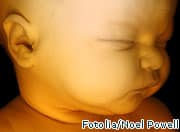An increasing number of women expecting multiple births are aborting one or more of their unborn babies.
Government figures show that in 2010 85 women pregnant with two or more babies had a ‘selective reduction’ – which means choosing to end the life of at least one child in the womb.
Dr Peter Saunders, CEO of the Christian Medical Fellowship, said: “There is no doubt that the rising use of IVF has contributed to a rise in multiple pregnancies.
Life
“If prospective parents are not willing to have twins, then they should not be implanting more than one embryo at a time.
“Parental preference should never take precedence over the right to life of the unborn child.”
He also commented that “there is very little evidence to suggest that parents choosing IVF will be any more successful in having a successful pregnancy implanting two embryos at once rather than one at a time”.
Grief
He said: “Furthermore some families who electively abort one of their children go on to experience a lot of grief. At every milestone for the child they decided to keep, there is this ghost in the room, this feeling that there should have been two or more of them.
“There is an urgent need to educate couples about these matters”.
The figures, released under freedom of information legislation, reveal that 101 babies were aborted as a result of selective reductions in 2010, with some cases involving women aborting more than one of their children.
Selective
Of the 85 women, 51 were expecting twins and had one of their babies aborted.
There were twenty abortions to ‘reduce’ triplets to twins and nine to take a pregnancy from triplets to a single child.
In 2006 the number of women who had a selective reduction stood at 59.
Guidelines
A spokesman for the Department of Health said: “Over three quarters, 78 per cent, of the selective terminations were performed under ground E – that there is substantial risk that if the child were born it would suffer from such physical or mental abnormalities as to be seriously handicapped”.
The National Institute for Health and Clinical Excellence is currently reviewing NHS guidelines for fertility treatment and is expected to examine the issue of multiple pregnancy.


